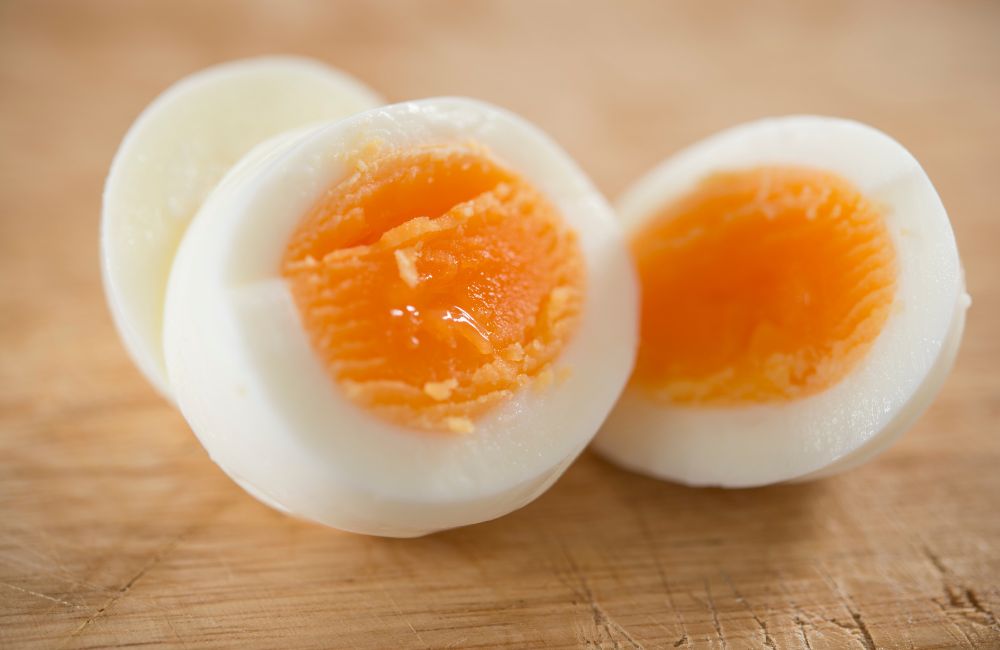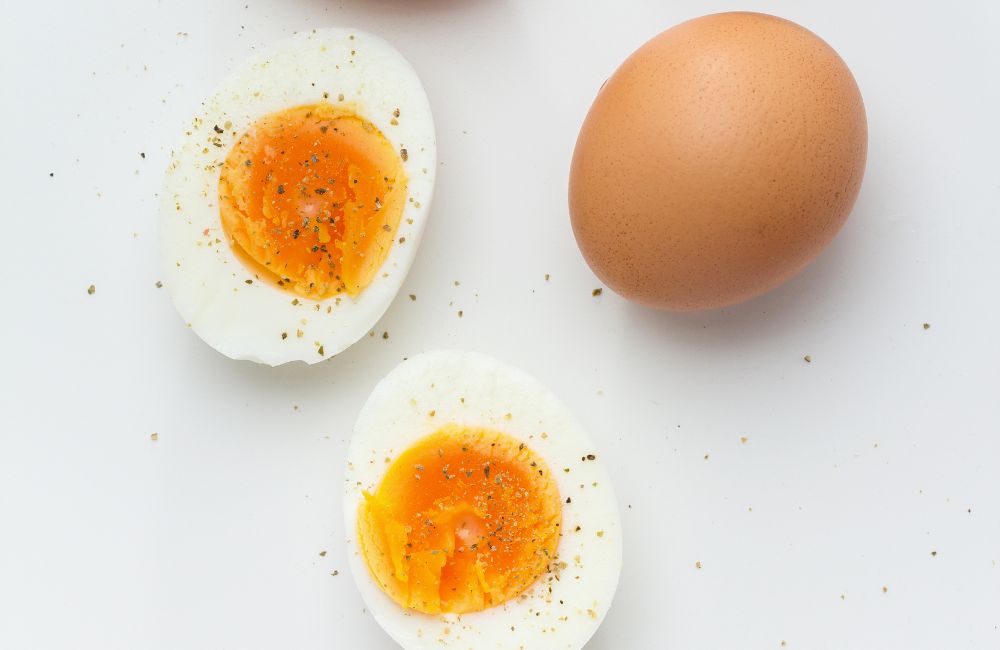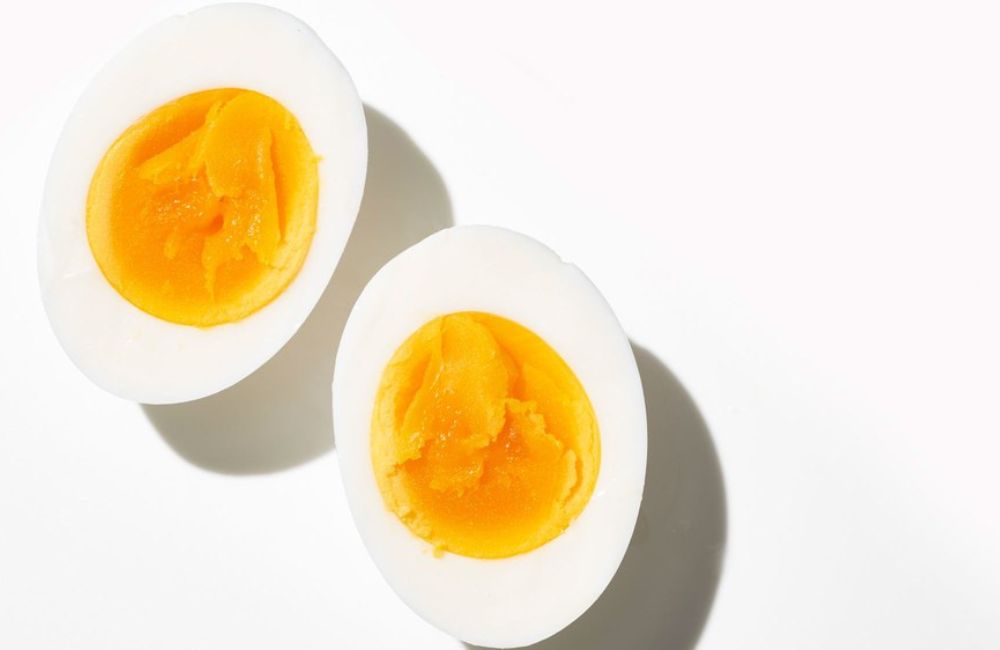
Egg fanatic? The boiled egg diet might sound like a dream come true, especially if you’re looking to shed pounds quickly. But before you hard-boil your way to breakfast, lunch, and dinner, let’s separate the yolk from the white.
This plan might offer a quick weight loss fix, but it’s unlikely to be a sustainable solution for long-term health. Intrigued? Dive deeper to explore how the diet works, weigh the pros and cons, and (if you choose) how to follow it with some safety tips in mind.
You may also like:
- How to Lose 20 Pounds In a Month: 8 Science-Backed Steps
- 20 Fat-burning Foods Scientifically Proven to Help Aid Weight Loss
- How to Lose 30 Pounds In a Month: 12 Simple Steps, Backed by Science
How Does the Egg Diet Work?

As much as you, and millions of other people, want to lose weight, it’s practically impossible to cut on the pounds without decreasing your calorie intake.
Now, granted it shouldn’t be rigorous, to the point where you starve yourself, but, you want to get the right nutrients (legumes, meats, fruits, etc) in with the least amount of calories possible.
Eggs are a good source of protein and efficient calorie burners (since high-protein foods boost metabolism to break themselves down).
They’re capable of providing a lot of energy throughout the day. That’s why they’re usually added as a part of a healthy diet.
If you’re not familiar with the nutritional anatomy of the egg, you should know that the white part is lean protein, while the yellow egg yolk is filled with healthy nutrients.
One medium hard-boiled egg weighs about 44 grams (g) and provides around 5.5 g of protein, or about 10–12% of an adult’s daily recommended intake.
Eggs also provide important vitamins and minerals, including calcium, iron, magnesium, phosphorus, potassium, selenium, folate, choline, vitamin A, vitamin B-12, vitamin D, and various antioxidants.
Although this boiled egg diet is fast and effective for weight loss, you need to consume a lot of fresh low-carb vegetables and fruits, whole grains, and beans.
And most importantly to reduce the calorie intake, cut back on high-calorie desserts, fast food, fizzy drinks, and sweets.
If you’re feeling hungry to an abnormal degree, it could be because you’re not getting enough water. Drink more! You’ll feel more energized, stay fit, and suppress the cravings to maintain fewer calories going inside you.
Is the 14-Day Boiled Egg Diet Safe and Effective?

Although there’s no conclusive evidence from a study for the effectiveness and health benefits of this diet, the nutritional facts of eggs overall support the protein-rich, calorie-burning element.
Note that as a low-calorie diet, it’s effective for quick weight loss on a short-term basis (it spans only 14 days for a reason).
But over time, the boiled egg diet isn’t recommended because nutrient deprivation over time can damage your body, off-balance your metabolism, and increase your risk for various health conditions.
But again, if you want to cut weight to say, start combatting obesity or lose a couple of pounds fast, you can try this egg diet and see the results by yourself.
Are There Side Effects of Eating Mostly Boiled Eggs?
The low-calorie nature of the egg diet plan restricts many carbs and high-fiber foods, so you may miss the mark on your daily fiber intake if you’re not careful.
Men 50 and under should get at least 38 grams of fiber and women should get at least 25g of fiber.
Low Fiber levels mean colon cancer, unhealthy cholesterol levels, constipation, and diverticulosis.
Additionally, forgetting to maintain a nutrition balance in this restrictive diet means you’re filling up on a lot of cholesterol in eggs, which, as a recent study shows can increase your risk of heart disease.
Another study has shown that high levels of daily egg consumption are associated with a higher risk of type 2 diabetes.
It’s always worthwhile to speak to a registered dietitian or doctor to discuss the effect on your overall health and if it’s an effective weight loss plan given your nutritional needs.
Types of Egg Diets

Egg diet participants have a few variations to choose from. You can try one variation this week, another next week, and another the following week in your egg diet plan.
Here are a few variations of the egg diet plan you can substitute if things get boring or you’re looking for some extra benefits.
Egg and Grapefruit Diet
It lasts for the same period of time as the 14-day egg diet. With this eating plan, you consume half a grapefruit with your egg or lean protein at every meal. No other fruits are allowed.
Egg-Only Diet
An egg diet based on only eggs is called a mono diet. Diets that consist of eating only a single food for a prolonged period of time are considered to be mono diets, which are unhealthful weight loss programs.
In this program, people eat only hard-boiled eggs and water for two weeks. As you can imagine, exercising on this plan isn’t recommended due to the extreme fatigue you will likely experience.
“Medical” Egg Diet
You have to eat one egg and one piece of bread three times a day on this egg diet. You can eat any amount of fruit and vegetables you want. Water, black coffee, and other zero-calorie drinks are allowed.
As long as no calories are added, you can prepare eggs however you like. This means you cannot use butter or oil while cooking your egg.
Those who follow this diet believe that it is used in medical settings to reduce a patient’s weight before surgery, but there is no evidence to support that claim.
While some bariatric physicians do suggest diets before surgery, they’re usually liquid diets (including meal replacement shakes) supervised by a physician.
Keto Egg Diet
The keto diet requires you to consume more fat to put your body into a state of ketosis. For this version of the egg diet, eating eggs with butter and cheese will cause your body to produce ketones.
According to the Internet, the most popular ratio for egg to fat (cheese or butter) is one egg to one tablespoon.
Example Boiled Egg Diet – Two-Week Menu:
As we said, you can’t just go around eating eggs all day on your calorie deficit. That’s counterproductive to your health.
You need a proper, balanced meal plan amid your nevertheless restrictive, low-calorie keto diet.
That means incorporating other healthy food (e.g. non-starchy vegetables) into your high-protein diet and eating plan (regularly scheduled meals are also important).
Boiled Egg Diet – FIRST WEEK:

Monday
- Breakfast: 2 boiled eggs and 1 citric fruit
- Lunch: 2 slices of bread and some fruit
- Dinner: a bowl of salad and chicken
TUESDAY
- Breakfast: 2 boiled eggs and 1 citric fruit
- Lunch: green vegetable salad and chicken
- Dinner: 2 boiled eggs, 1 orange, and veggie salad
WEDNESDAY
- Breakfast: 2 boiled eggs and 1 citric fruit
- Lunch: low-fat cheese, 1 slice of bread, 1 tomato
- Dinner: chicken and salad
THURSDAY
- Breakfast: 2 boiled eggs and 1 citric fruit
- Lunch: fruit only
- Dinner: chicken and salad
FRIDAY
- Breakfast: 2 boiled eggs and 1 citric fruit
- Lunch: steamed veggies and 2 eggs
- Dinner: fish and salad
SATURDAY
- Breakfast: 2 boiled eggs and 1 citric fruit
- Lunch: fruit only
- Dinner: veggies and chicken
SUNDAY
- Breakfast: 2 boiled eggs and 1 citric fruit
- Lunch: tomato salad, chicken, steamed veggies
- Dinner: steamed veggies
Boiled Egg Diet – SECOND WEEK:
MONDAY
- Breakfast: two boiled eggs
- Lunch: salad and chicken
- Dinner: orange, salad, and two boiled eggs
TUESDAY
- Breakfast: two boiled eggs
- Lunch: two boiled eggs and steamed vegetables
- Dinner: spinach and barbecued fish
WEDNESDAY
- Breakfast: two boiled eggs and fruit
- Lunch: cooked chicken and salad
- Dinner: orange, salad, and two boiled eggs
THURSDAY
- Breakfast: two boiled eggs and grapefruit
- Lunch: steamed vegetables, two boiled eggs, and low-fat cheese
- Dinner: steamed chicken and salad
FRIDAY
- Breakfast: two boiled eggs and fruit
- Lunch: tuna salad
- Dinner: two boiled eggs and salad
SATURDAY
- Breakfast: two boiled eggs and fruit
- Lunch: cooked chicken and salad
- Dinner: fruits
SUNDAY
- Breakfast: two boiled eggs
- Lunch
- Dinner: steamed vegetables and steamed chicken
You can easily follow the simple menu. As the egg diet plan is a ketogenic diet (low on carbohydrates), don’t forget to consult your physician before starting it.
Remember that for optimal and healthy weight loss, you want to complement any diet with sufficient exercise to burn fat faster and build/maintain muscle.
Get some amazing results and try out the low-calorie diet!
Should You Try the Hard-Boiled Egg Diet?
Overall, the hard-boiled egg diet is only masquerading as a healthy diet.
While this diet plan contains many healthy foods, it is not the best way to lose weight or improve your health.
This is because the egg diet is extremely restrictive and too low-calorie for most people.
While this diet may help with short-term weight loss, the weight will likely return soon after you stop dieting.
Furthermore, outside of a handful of studies about high protein breakfasts and weight loss, there is no evidence behind the diet.
Nor do those studies suggest that eggs have any magical power, other than the fact that they are a low-calorie, nutritious food.
Moreover, most of the research about the health benefits of eggs looks at including eggs as part of a healthy diet.
It also offers no proof that eating a large quantity of eggs will increase these benefits.
In fact, consuming a low-calorie diet that consists mostly of eggs can displace other, nutritious foods from your diet.
Ultimately, this egg diet appears to be another fad diet.
It may not be the best approach for long-term weight loss.
Instead of following the hard-boiled egg diet, try adding more eggs to your meals and snacks as part of a healthy lifestyle change.
Currently, the American Heart Association’s stance is that one whole egg (or two egg whites) per day can be part of a healthy diet.


